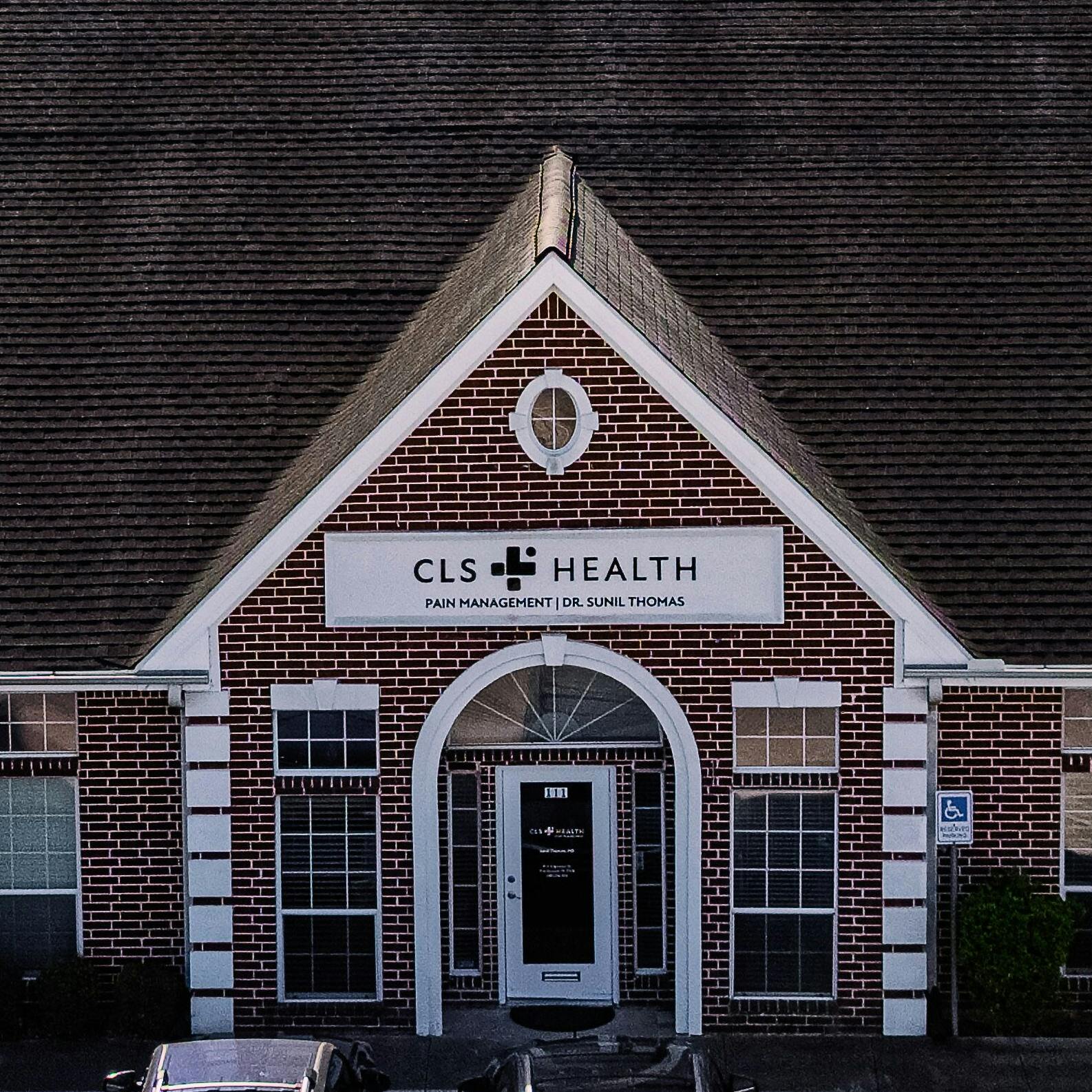Pain Management

Reclaim Your Life from Chronic Pain
Chronic pain is unpredictable, relentless, and isolating. It can take over your life, making work, social activities, and even sleep difficult. When relief feels out of reach, it is easy to lose hope. If this sounds familiar, you're not alone. More than 50 million adults in the U.S. live with chronic pain.
You don't have to live with pain. CLS Health specialists treat chronic and acute conditions from migraines and arthritis to back and nerve pain.
With personalized treatment plans including minimally invasive procedures, targeted injections, and advanced therapies like radiofrequency ablation, we are committed to helping you feel better and get back to the life you love.
When Should You See a Pain Management Doctor?
You should see a pain management doctor if you experience:
- Chronic pain lasting more than 3 months that doesn’t improve with medications or home remedies.
- Severe back, neck, joint, or nerve pain affecting daily activities.
- Pain after surgery or injury that lingers beyond the normal healing period.
- Nerve-related pain (burning, tingling, or shooting pain) from conditions like sciatica or neuropathy.
- Migraines or frequent headaches unresponsive to over-the-counter treatments.
- Pain from conditions like arthritis, fibromyalgia, or spinal stenosis.
- Cancer-related pain
A pain management specialist can provide advanced treatments like injections, nerve blocks, and minimally invasive procedures to help relieve pain and improve quality of life.
Providers

Anesthesiology, Pain Medicine

Pain Medicine

Chisom, Eneremadu
NP
Pain Medicine

Catherine Ijeoma Mgbodu
NP
Pain Medicine

Interventional Pain Medicine, Pain Medicine

Pain Medicine

Pain Medicine

Laverne Denecia Rideau
NP
Pain Medicine

G. Silky Patel
MD
Interventional Pain Medicine

Carolina Rock
NP
Pain Medicine

Seema Rasheed
MD
Physical Medicine and Rehabilitation, Pain Medicine
Conditions We Treat
We treat nerve pain caused by herniated and degenerative discs, sciatica/lumbar radiculopathy, facet joint syndrome, spinal stenosis, SI joint dysfunction, post-laminectomy (failed back surgery) syndrome, peripheral neuropathy, and occipital neuralgia. These problems can compress or irritate nerves, causing back/neck pain, tingling, weakness, or radiating headaches. With targeted imaging and evidence-based therapies, we relieve pain, restore mobility, and help prevent chronic nerve damage.
Our team manages arthritis (osteoarthritis, rheumatoid), shoulder/hip/knee pain, bursitis, tendonitis, and myofascial pain/trigger points, as well as migraine and chronic headaches. Care plans focus on reducing joint pain & inflammation, improving joint mechanics, and easing muscle spasm. Treatment may include medications, guided therapy, and precise injections to get you moving again.
We specialize in complex regional pain syndrome (CRPS), fibromyalgia, postherpetic neuralgia, and cancer-related pain. Using a multidisciplinary approach, we combine medications, interventional procedures, and rehab strategies to reduce pain and improve daily function. Care is individualized and closely monitored for safety and results.
Pain Treatments
For nerve-related pain, we perform epidural steroid injections (ESI), facet joint injections, medial branch blocks, and facet radiofrequency ablation (RFA/neurotomy) to calm inflamed nerves and stop pain signals. Targeted options like sympathetic nerve blocks (e.g., for CRPS) and occipital nerve blocks (for occipital neuralgia/migraines) provide focused relief. All procedures are image-guided for accuracy and safety.
We offer joint injections for the hip, knee, shoulder, and SI joint to reduce inflammation at the source. Genicular nerve blocks and RFA provide durable knee pain relief, while bursa injections and trigger point injections address bursitis and myofascial pain. We also provide injections for migraines and chronic headaches to decrease frequency and severity.
To diagnose and treat disc-related pain, we use provocative discography, disc bi-acuplasty (radiofrequency to treat discogenic pain), and percutaneous lumbar discectomy for herniated discs. Minimally Invasive Lumbar Decompression (MILD) relieves spinal stenosis by removing thickened ligaments, while kyphoplasty restores height and stability after compression fractures. These techniques aim for smaller incisions, faster recovery, and lasting relief.
For chronic pain unresponsive to conservative care, we offer spinal cord stimulation (SCS) and dorsal root ganglion (DRG) stimulation to modulate pain signals before they reach the brain. We also provide peripheral nerve stimulation (PNS), including StimRouter® for targeted nerve pain in the limbs or trunk. Trials are performed first to confirm benefit before any permanent implant.
Don't see your insurance listed? We may still accept it!
CLS Health updates accepted insurance plans regularly. Please call (281) 724-1860 to verify your coverage.
- Aetna Select
- Open Access Selects
- Elect Choice
- Aetna Open Access Elect Choice
- Aetna Choice POS II
- Managed Choice
- Open Choice PPO
- Aetna Medicare Advantage Plans
CLS Health does not accept:
- Aetna CVS Marketplace Plans
* Some providers may not accept this insurance, please call to confirm
- Superior Ambetter Core (Complete, Clear, Focused, Standard Silver and Gold)
- Superior Ambetter Value (Clear Value Silver, Focused Value Silver, CMS Standard Silver & Gold Value, Everyday Value Gold)
- Superior Ambetter Virtual (Ambetter Virtual Access Silver, CMS Standard Virtual Access Basic Silver, Ambetter Virtual Access Gold)
- Superior Health Plan CHIP*
- Superior Health Plan MAPD (Medicare Advantage Prescription Drug)
- Superior Health Plan Medicare
- Superior Health Plan MMP Medicaid*
- Superior Health Plan MMP Medicare
- Superior Health Plan STAR*
- Superior Health Plan STAR Kids*
- Superior Health Plan STAR+PLUS*
CLS Health participates in most Blue Cross Blue Shield plans including:
- Blue Choice PPO
- Blue Essentials
- Blue Essentials Access
- HealthSelect
- HealthSelect of Texas In Area
- Consumer Directed HealthSelect in Area
- HealthSelect of Texas Out of State
- Consumer Directed Health Select Out of State
- HealthSelect Secondary 65+
- Medicare Advantage HMO
- Medicare Advantage PPO
- Medicare Advantage Value HMO
- POS
- Traditional/Par Plan
- TRS-Active Care
- TRS-Care Standard
- BCBS MyBlue Health (Marketplace)
*Some providers may not accept Community Health Choice, please call to confirm
- MarketplacePremier
- Medicaid*CHIPCHIP PerinateSTAR
- Medicare AdvantageDual-Special Needs Plan (D-SNP)
CLS Health accepts most Cigna plans, including:
- Cigna HMO
- Cigna Local Plus
- Cigna Open Access Plus
- Cigna PPO
- ChoiceCare PPO
- EPO
- HMO
- HMO Premier
- Medicare Advantage Plans
- HumanaChoice - Medicare Advantage PPO plan
- Humana Gold Choice - Medicare Advantage Private Fee-for-Service (PFFS) plan
- Human Gold Plus - Medicare Advantage HMO & Special Needs Plan
- Military (TRICARE South Region Military Health Plan)
- POS - including Choice POS, National POS Open Access/Plus and Preferred POS Open Access.
- PPO
*Some providers may not accept United Healthcare, please call to confirm
- Commercial, HMO, POS, EPO and PPO Plans (Charter, Choice,Core, Doctors Plan, Freedon, Heritage, Navigate, Nexus ACO, Options PPO, Passport Connect, Select)
- Indemnity
- Medicare Advantage (AARP, Care Improvement Plus, C-SNP, D-SNP, I-SNP, Erickson Advantage, ERS Medicare Advantage, TRS-Care Medicare Advantage, UnitedHealthcare Chronic Complete, UnitedHealthcare Connected (Medicare-Medicaid Plan), UnitedHealthcare Dual Complete, UnitedHealthcare Group Medicare Advantage PPO, United Healthcare Medicare Complete)
- Community Plans* (CHIP, CHIP Perinate, Star, Star Kids, Star Plus, MMP)
- Wellmed (Wellmed Dual SNP Focus, Wellmed Medicare Advantage Focus)
*Some providers may not accept Wellpoint, please call to confirm
- Medicaid (All Texas Plans Including the Below)*
- CHIP
- CHIP Perinate
- STAR
- STAR+PLUS
- STAR Kids
- Medicare Advantage
- C-SNP
- D-SNP
- I-SNP
- Medicare Advantage HMO
- Medicare-Medicaid (MMP)
- Medicare-Medicaid Program (MMP)
- STAR+PLUS MMP
*Some providers may not accept insurance, please call to confirm
PPO Networks
- Beechstreet PPO
- Carnival Cruise Lines PPO
- Envolve Benefit Options Vision-PPO, HMO
- First Health
- Curative/First Health
- Galaxy Health Network
- HealthSmart Preferred Care
- Accel
- Healthsmart Payors Organization
- Multiplan PPO
- Tricare (Humana) PPO/Prime
Employer-Specific Plans
- Brazoria County Employees – Aetna TPA Brazoria County Employees
Workers’ Compensation Plans
- Workers’ Comp
- Auto & Workers’ Comp
Medicare and Medicare Advantage
- Medicare Traditional
- Medicare Advantage
- Memorial Hermann Health Solutions Commercial and Medicare
- Molina Medicare Complete Care HMO SNP
- Medicare-Medicaid Program (MMP)
- STAR+PLUS MMP
- Alignment Health Plan
- AllyAlign Health
- American Health Plans
- Florida Complete Care
- Gold Kidney Health Plan
- Imperial Health
- Independent Health
- Kaiser Foundation Health Plan of Washington
- Kaiser Foundation Health Plan of Colorado
- Mass Advantage
- Presbyterian Health Plan
- PriorityHealth
- Provider Partners
- SCAN
- UCare
- Vantage Health Plan
- Verda Healthcare
- Zing Health
Medicaid and CHIP Programs
- Molina Healthcare* (Marketplace, Medicaid, CHIP, CHIP Perinate, STAR, STAR Kids, STAR+PLUS)
- Texas Children's Health Plans*
- TMHP (Traditional Medicaid) Traditional Medicaid
Specialty Plans
- VA Community Cares Network CCN
FAQs
To relieve lower back pain, try:
- Gentle stretching and low-impact exercises like yoga or walking.
- Hot or cold therapy (ice for inflammation, heat for muscle relaxation).
- Over-the-counter pain relievers (ibuprofen or acetaminophen).
- Proper posture and ergonomic adjustments when sitting or sleeping.
If pain persists for more than a few weeks, consult a pain management specialist.
For quick knee pain relief, you can:
- Rest and elevate the knee to reduce swelling.
- Apply ice packs for 15-20 minutes every few hours.
- Use compression wraps to support the joint.
- Take anti-inflammatory medications like ibuprofen.
- Consider joint injections or physical therapy if pain persists.
To ease neck pain, try:
- Gentle neck stretches and exercises to improve mobility.
- Apply heat or cold packs to reduce stiffness and inflammation.
- Use an ergonomic pillow and maintain good posture.
- Avoid prolonged screen time and take frequent breaks.
For chronic or severe neck pain, a pain specialist may recommend nerve blocks, trigger point injections, or physical therapy.
Chronic pain is pain that lasts more than 3-6 months, often persisting beyond normal healing time. It can result from:
- Arthritis, nerve damage, or spine conditions.
- Injuries or post-surgical pain.
- Fibromyalgia, migraines, or complex regional pain syndrome (CR
Pain management specialists help diagnose and treat chronic pain using medications, injections, and interventional therapies.
- Pain management doctors diagnose and treat chronic and acute pain through:
- Medication management (anti-inflammatories, muscle relaxers, nerve pain medications).
- Interventional procedures like epidural steroid injections, nerve blocks, and radiofrequency ablation.
- Physical therapy referrals to improve mobility and function.
- Lifestyle modifications and pain coping strategies.
During your first visit, a pain management specialist will:
- Review your medical history and symptoms.
- Perform a physical examination and possibly imaging tests.
- Discuss treatment options, including medications, therapy, and procedures.
- Develop a personalized pain management plan.
- Anti-inflammatory drugs (NSAIDs) – Ibuprofen, naproxen.
- Muscle relaxants – Used for muscle spasms.
- Nerve pain medications – Gabapentin, pregabalin.
- Corticosteroid injections – Reduce inflammation in joints and spine.
- Opioids (reserved for severe cases) – Only used under strict guidelines.
Spinal conditions that may require pain management include:
- Herniated discs – Pressing on nerves, causing back and leg pain.
- Sciatica – Nerve pain radiating from the lower back to the legs.
- Spinal stenosis – Narrowing of the spinal canal, leading to nerve compression.
- Facet joint arthritis – Inflammation in the small joints of the spine.
When visiting a pain specialist, ask:
- What is causing my pain?
- What are my treatment options?
- Are there minimally invasive procedures that could help?
- What are the risks and benefits of each treatment?
- How can I improve pain through lifestyle changes?
Yes, pain management injections like epidural steroid injections, nerve blocks, and joint injections are:
- Minimally invasive and performed under imaging guidance.
- Designed to provide targeted pain relief.
- Generally safe with a low risk of complications when performed by an experienced specialist.
These injections help reduce inflammation and improve mobility, allowing patients to participate in physical therapy and long-term pain relief strategies.









